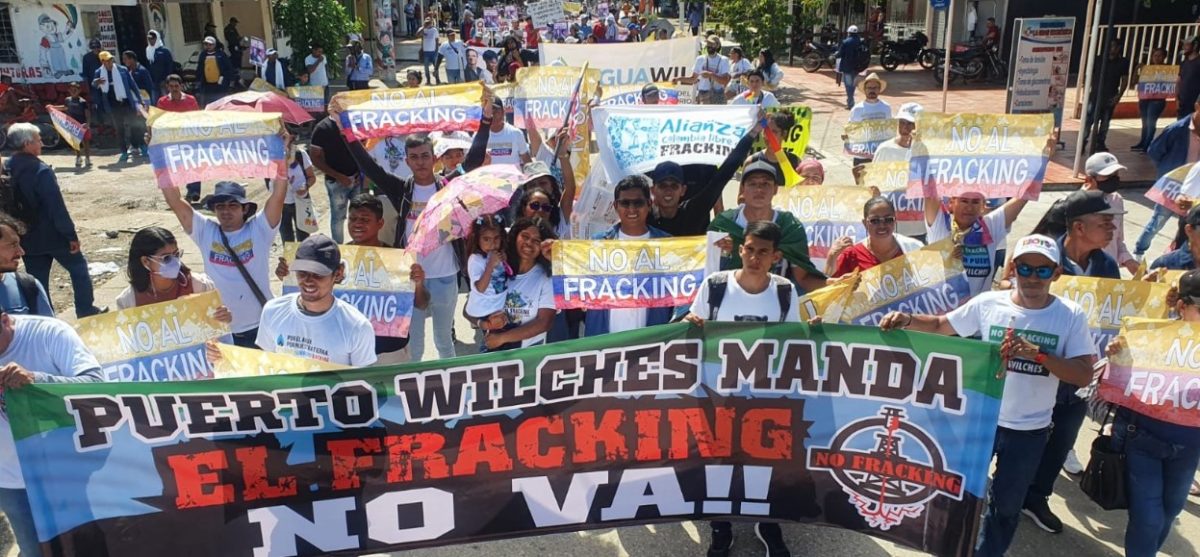Colombian environmental defenders in the oil producing department (state) of Santander are concerned about being targeted for their vocal opposition to fracking by armed and dangerous paramilitary groups.
It is in this context of threats and violence that the Colombian human rights group CREDHOS says: “May the defence of water, territory and human rights not cost us our lives!”
Drilling for the Kalé fracking pilot project could begin as soon as this August, while the Platero fracking pilot project could begin in early 2023.
Both the Kalé and Platero projects are located in the community of Puerto Wilches, Santander and both would be operated by the Colombian oil company Ecopetrol.
The non-governmental organization Corporacion Compromiso (Commitment Corporation) has cited 68 threats against environmental defenders in Santander in just the first three months of this year alone.
Al Jazeera has also recently reported: “Local environmental defenders and a representative of the JEP [Special Jurisdiction for Peace] suspect a connection between the paramilitary groups intimidating them and the state-owned Ecopetrol, which is behind the fracking project.”
Caracol Radio has also reported that the Investigation and Accusation Unit of the JEP says that most of the threats against environmental leaders are coming from paramilitary groups such as the Clan del Golfo (AGC) and the Black Eagles (Águilas Negras).
A JEP representative told Al Jazeera: “Many contractors and those connected to these [fracking] projects have links to illegal groups.”
Ecopetrol has denied that it has links with armed groups.
Ecopetrol says it “promotes a corporate culture of respect and promotion of human rights.”
But on a recent Peace Brigades International-Canada webinar, Colombian environmental defender Carolina Agón stated: “This is not a secret. Ecopetrol has ties and is working hand in hand with the illegal armed groups.”
Carolina further noted: “We know that the companies are working together with the self-defence forces. We have the AGC and AUC working in our territory. I’ve received threats from both of these groups.”
This year, Agón has received a threatening telephone call, was named in a paramilitary pamphlet, had armed men arrive at her house, had her house robbed, and most recently was shot at on April 18.
She added: “I’m not sure which of these groups tried to kill me.”
Environmental defender Juan Camilo Delgado also commented: “It’s very concerning when we look at the historic relationship between the oil companies and organized illegal groups, specifically paramilitary structures, which has led to human rights violations and attacks against social leaders and environmental leaders from the municipality of Puerto Wilches.”
There are Canadian connections to this human rights crisis.
Bronwen Tucker, the Global Public Finance Co-Manager at Oil Change International, highlighted that Export Development Canada provided $1.4 billion in government-backed loans to oil and gas in Colombia between 2012 and 2020.
Significantly, Tucker also specified that during this period Export Development Canada provided $300 million to Ecopetrol.
The Banking on Climate Chaos website also reveals Scotiabank provided USD $665 million to Ecopetrol in 2018, another $666.67 million in 2020, and $1.7 billion in 2021 for a total of $3.0 billion in financing.
Beyond this, Colombia’s former Minister of Mines and Energy named Calgary-based Parex Resources as among the companies “seeking to operate” a fracking block, while Calgary-based Canacol Energy Ltd. has welcomed the prospect of commercial fracking in Colombia.
Afro-Colombian environmental defender Yuvelis Morales has commented: “When your companies and banks are investing in mining and energy megaprojects in other countries where human rights are being violated every day, you are not an environmentalist country, you are not a green country. I’m sorry to be so blunt. This is a reality that people don’t often want to say because when you open your mouth that could mean you are shot in the forehead.”
The first death threat against Morales came in January 2021, not long after she had organized an anti-fracking protest in December 2020. Morales says: “Some armed men came to my house and trapped me. They put a gun to my head.”
Last year, Morales told PBI-Canada: “When we became a problem for the oil companies, those interested in promoting fracking and its economic benefits, they started to threaten, stigmatize, and silence us.”
Additional threats this past February forced Morales to leave Colombia.
While the fracking pilot projects pose deadly risks for Colombian environmental defenders, fracking also poses a global danger.
It has been estimated that commercial fracking in Colombia could extract 7 billion barrels of shale oil and 30 trillion cubic feet of shale gas.
The latest research from the Intergovernmental Panel on Climate Change (IPCC) says that for even just a 50 per cent chance of holding global warming to 1.5° Celsius, the use of oil must drop by 60 per cent and gas by 45 per cent.
More than 450 organizations and individuals have endorsed the global call to end fracking worldwide given the “continued production, trade and use of fracked hydrocarbons for energy, petrochemicals and plastics torpedoes our global efforts to tackle climate change and violates basic human rights.”
We continue to watch closely what’s happening in Colombia.



